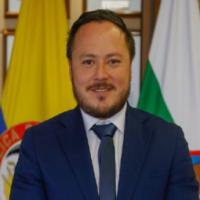As part of COP26 Multilevel Action pavilion 2021, ICLEI Sustainable Mobility team organized the webinar:
Game On: City Ambition Towards Future-Proof and Equitable Mobility Systems
on 10 November @ 10:00 – 11:15 UTC


As part of COP26 Multilevel Action pavilion 2021, ICLEI Sustainable Mobility team organized the webinar:
Game On: City Ambition Towards Future-Proof and Equitable Mobility Systems
on 10 November @ 10:00 – 11:15 UTC
Climate change represents a significant environmental challenge of our time and transport has a huge role to play in the economy reaching net-zero. Transport emissions have grown faster than many other sectors over the last 50 years and demand for transport will continue to grow massively in the coming decades. As a result, CO2 emissions from transport activity will continue to increase. Cities around the world are taking action to meet the challenge of climate change and are raising the ambition towards net-zero transport.
As the world’s transportation landscape changes, city, and transportation leaders must grapple with new ways to provide the most efficient, safe, and sustainable transportation experience to their communities. The scale of ambition and urgency to act quickly can improve residents’ health, advance equity, and create better places to live and travel, while simultaneously promoting clean economic growth.
This session brought together high-level representatives from five cities and regions worldwide to showcase concrete measures in bridging the gap between ambition and action to cut carbon emissions while advocating for a leave-no-one-behind perspective in transportation systems.
Through the session, attendees got insights on:
Moderator
Speakers

“In partnership with ICLEI Ecologistics initiative Taoyuan government has promoted the eight EcoLogistics principles as a clear pathway for cities to achieve climate ambitions, integrating urban freight and public-public partnerships. We set five Ecologistics demonstration project allowing for testing different solutions in different environments, such as smart and warehousing systems and electric and hydrogen-fueled vehicles.”
An-Pang Kao, Deputy Mayor Taoyuan City

“What has happened in the 20th century in our cities? They have been designed for cars to move and park and not for people and now is the time to propose a radical change in urban design. That is why what we do now is to prioritize people, and the response of the citizenship has been positive. The cultural change in mobility is already happening in Barcelona. So for me, this is a moment of opportunity rather than barriers, and if there is ambition and political will, change is possible.”
Janet Sanz, Deputy Mayor, Barcelona, Spain

“Certainly next generation of EU policies and investment presents a unique opportunity to align and allocate resources for renewing the fleet and investing in development research, particularly in the renewable fuels and digitalization fields. Also, public transport has to recover user’s trust, because today users have a low opinion of it, worsened by the COVID pandemic.”
Elisabetta Tromellini, Head of CSR-Sustainability Department, FNM Group, Milan, Italy

“We have one out of the two free-of-charge public sharing systems in Colombia. This year we will renew the bicycle after seven years and half of them will be e-bikes. Why e-bikes? Because people that live in hillier and poorer areas feel discouraged to use regular bikes as they might ride down to the city centre, but they will not be capable of riding back uphill. So we expect to expand the system to the periphery and enable more people to consider bicycles as a comfortable and convenient transport mode.”
Juan Sebastián Ramos, Secretary of the Environment of Manizales, Colombia

“Most women have suffered violence or harassment in public transportation, which is why I think it is vital that today we are putting a gender perspective on the table. It is also important to highlight the inclusion of the poorest areas of the city in order to bring transportation options to these neighborhoods. It is imperative to introduce a gender and equity perspective in the climate and mobility agenda.”
Clara Muzzio, Minister of Public Space of Buenos Aires, Argentina